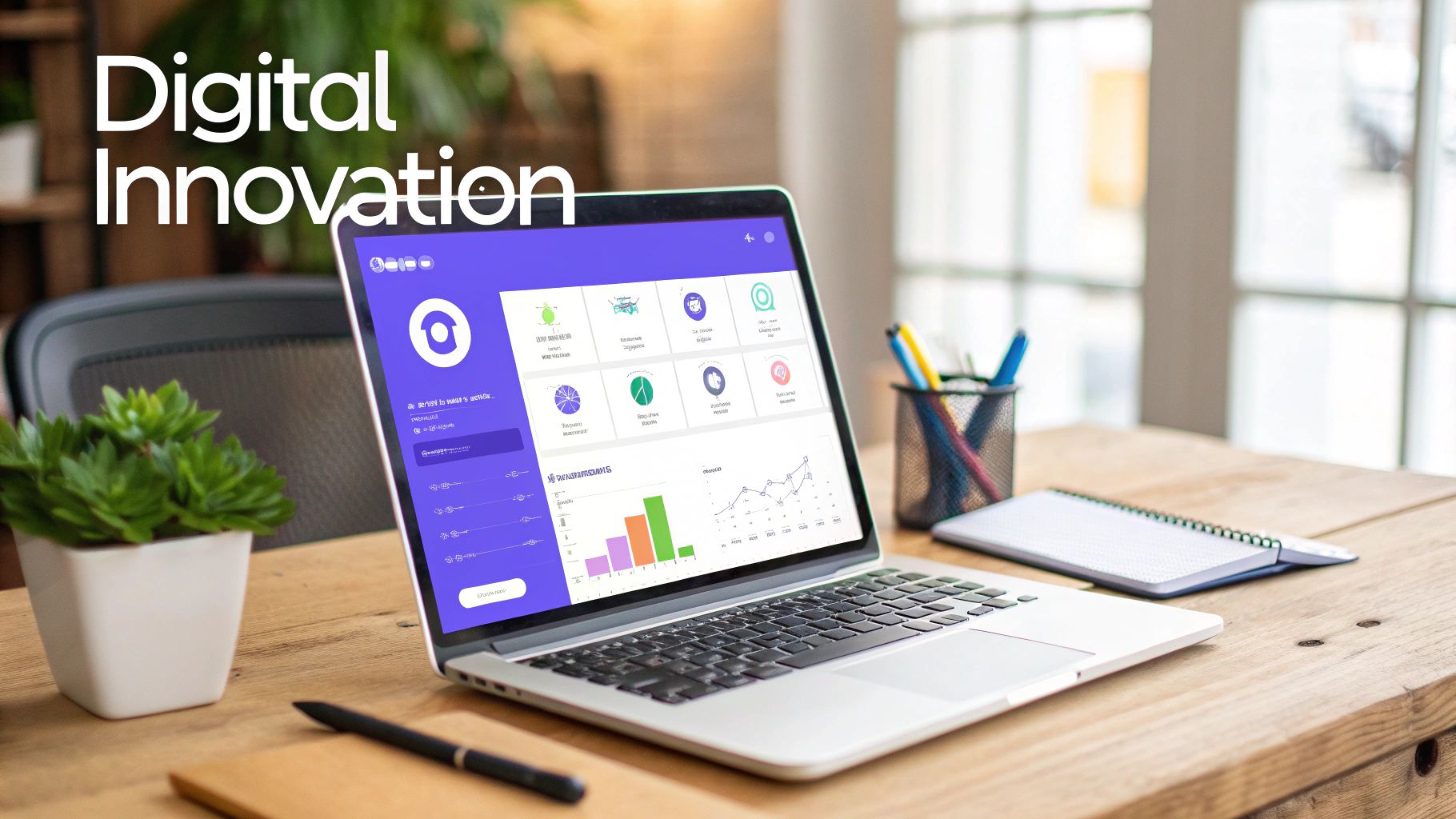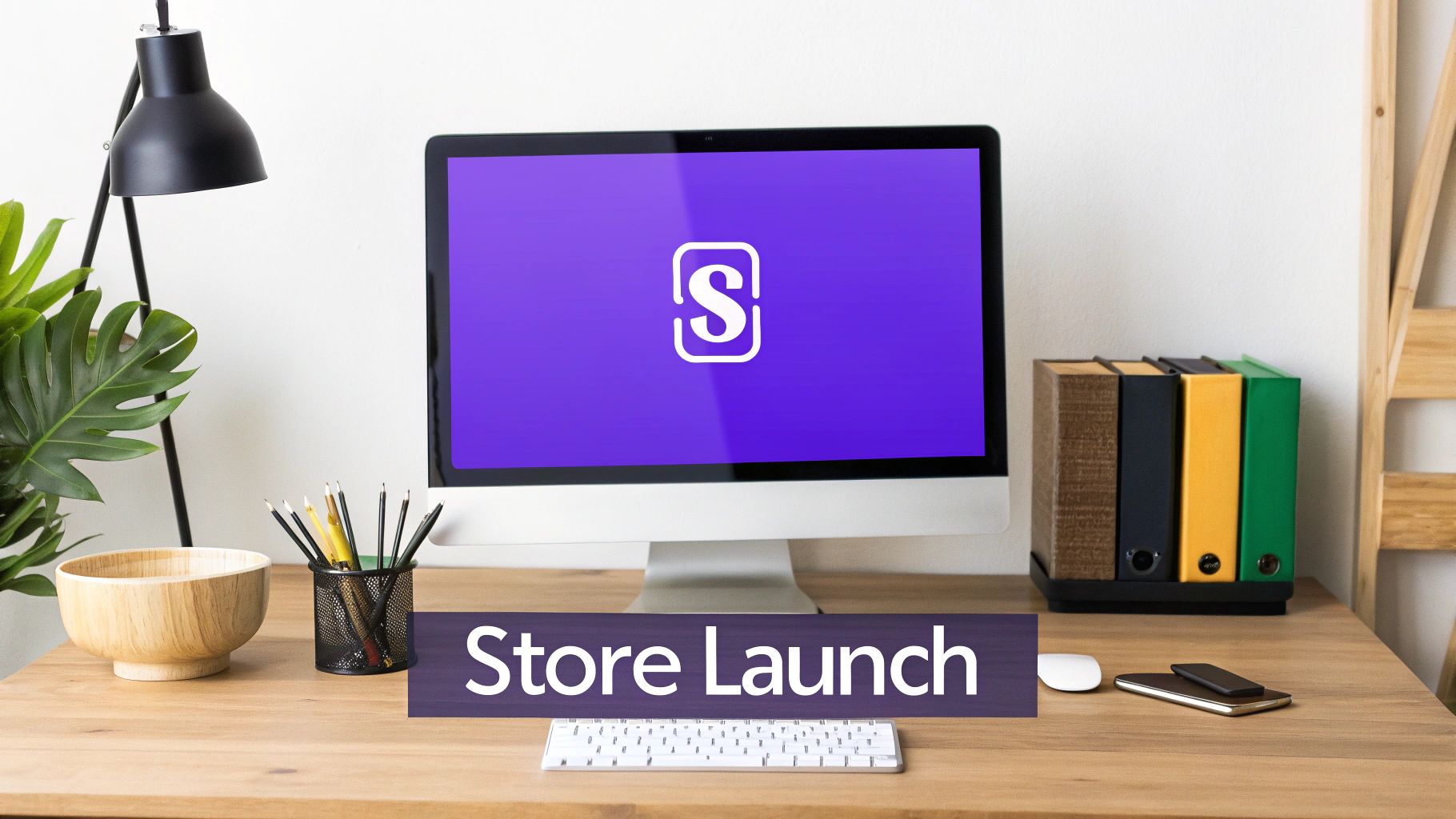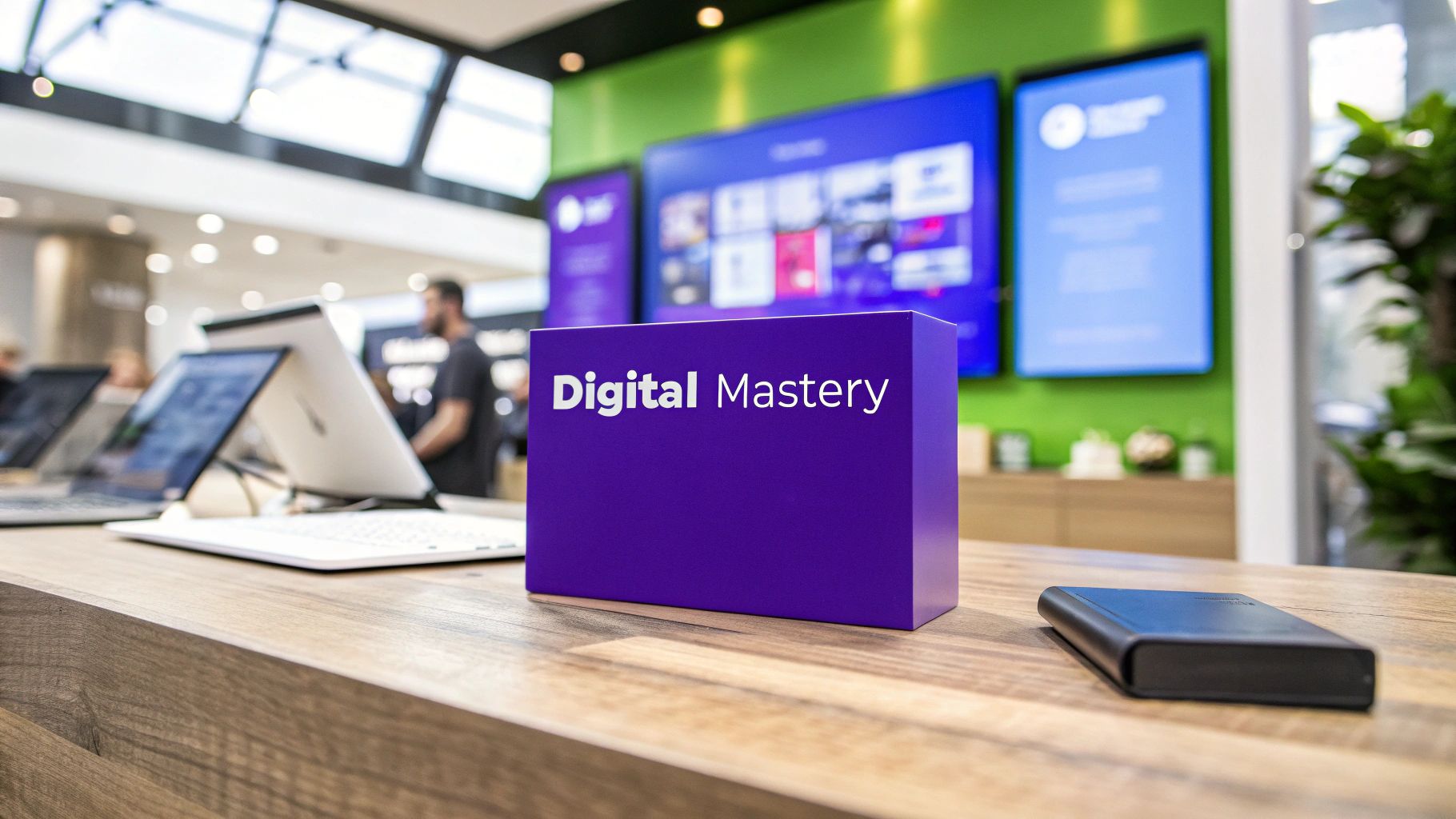Breaking Ground: Your Digital Products Journey on Shopify
Launching a digital product business can feel daunting. However, Shopify offers a powerful platform for digital entrepreneurs, even without native digital selling features. With the right strategy, you can transform your knowledge into a thriving online venture. This section guides you through selling digital products on Shopify, from selecting essential apps to optimizing your store for smooth delivery.

Essential Apps for Digital Product Delivery
Choosing the right apps is crucial for selling digital products on Shopify. While numerous apps exist, some are vital, while others are supplementary. Prioritize apps that simplify delivery and enhance the customer experience.
For instance, the Digital Downloads app or Skypilot are crucial for delivering digital files. These apps seamlessly integrate with your store, automatically sending customers a secure download link after purchase. This automation saves you valuable time and ensures a smooth customer journey. Consider exploring apps offering features like license key generation or content protection for enhanced security.
Shopify's adaptability and user-friendliness contribute to its popularity for selling digital products. With a significant market share as of 2025 and over 16,000 apps in the Shopify App Store, many support digital sales. This extensive app ecosystem lets you customize your store to meet your specific digital product needs. Since Shopify doesn't inherently support digital product sales like physical inventory, these third-party apps are indispensable for digital businesses. Discover more insights about Shopify statistics
Configuring Your Shopify Store for Digital Success
Correctly configuring your Shopify store is essential for long-term success, beyond selecting the right apps. Overlooking crucial settings during initial setup can lead to costly revisions down the line. A solid foundation is key.
-
Choosing the Right Theme: Select a theme that effectively showcases your digital products, emphasizing visuals and download information.
-
Secure Delivery System: Implement a system that prevents piracy while providing a seamless customer experience.
-
Store Settings: Carefully consider settings related to taxes, notifications, and checkout processes specific to digital goods.
Seamless Delivery and Happy Customers
The delivery process significantly impacts customer satisfaction. While automation is key, aim for a premium experience that exceeds a basic automated email.
Consider a branded delivery page with extra resources or a welcome message. This personal touch can enhance your product's perceived value and foster repeat business. Proactively addressing potential access issues and providing prompt customer support builds trust and loyalty. Mastering digital delivery transforms a transaction into an opportunity for lasting customer relationships.
Digital Gold Mines: Products That Actually Sell on Shopify

Selling digital products on Shopify offers a world of possibilities. Forget the tired "create an ebook" advice. This is about understanding what digital products consistently perform well and bring in real revenue. This section explores what's working for successful Shopify stores.
Beyond eBooks: Exploring the Spectrum of Digital Products
While ebooks have their place, diversifying your digital product offerings can unlock significant potential, particularly in less competitive niches. Here are some proven options:
-
Online Courses: These provide in-depth learning and allow for flexible pricing and recurring revenue through memberships. Structuring your expertise into modules increases perceived value and meets the rising demand for online education.
-
Digital Templates and Tools: From marketing templates for businesses to design assets for creatives, these tools offer practical solutions. Their value lies in saving users time and effort.
-
Licensed Digital Assets: Selling licenses for stock photos, music, or video footage generates passive income. This model capitalizes on the demand for high-quality creative resources without requiring constant product creation.
-
Premium Content Libraries & Memberships: Bundling digital products into a subscription-based library offers continuous value and builds a loyal following. This recurring revenue model can significantly boost profits.
For example, a Shopify store selling handmade jewelry could offer online courses on jewelry making, design templates for custom pieces, or a membership community for exclusive insights. This creates multiple income streams and establishes the store as an authority. Check out our article on top digital product business ideas for more inspiration.
To help you better understand the potential of different digital products, let's take a look at a comparison table:
Top-Performing Digital Products on Shopify
Comparison of popular digital product categories based on profit margin, competition level, and customer demand.
| Product Type | Profit Margin | Competition Level | Customer Demand | Technical Requirements |
|---|---|---|---|---|
| Online Courses | High | Medium | High | Video hosting, Course platform |
| Digital Templates & Tools | High | Medium | Medium | Design software, File hosting |
| Licensed Digital Assets | Medium | High | Medium | Asset management, Licensing platform |
| Premium Content Libraries & Memberships | High | Low | Medium | Content management, Membership platform |
This table highlights the potential of different digital product types. While online courses and memberships offer high-profit margins, they also require more technical setup. Licensed digital assets face higher competition but can generate passive income. Digital templates and tools strike a balance, offering decent profit margins with moderate competition.
Pricing Psychology and Overcoming Objections
Pricing digital products strategically is key. Customers often hesitate to pay for something intangible. Addressing this requires clear communication:
-
Highlight the Value Proposition: Clearly explain the benefits customers receive. Focus on the transformation your product offers, whether it's increased knowledge, improved skills, or time saved.
-
Offer Different Pricing Tiers: Cater to various budgets and needs, making your products accessible while highlighting premium options with added benefits.
-
Showcase Testimonials and Social Proof: Use positive reviews and user-generated content to build trust. Seeing how others have benefited can strongly influence buying decisions.
Offering guarantees, such as a money-back promise, can build customer confidence. This demonstrates your commitment to their satisfaction and reinforces the value of your digital product. By understanding customer psychology, you can effectively position your offerings and maximize your sales potential on Shopify.
Building Your Digital Storefront That Converts
Selling digital products on Shopify requires a different approach compared to physical goods. While Shopify doesn't directly support digital sales out of the box, its adaptable nature allows for a high-converting storefront with the proper setup. This section explores the technical side of building a digital store that's both efficient and secure.
Choosing the Right Theme for Digital Products
Your Shopify theme represents your online store's identity. For digital products, select a theme that emphasizes visuals and clearly displays download information. A clean, minimalist design can effectively highlight your product’s value without unnecessary distractions.
Consider themes with features like large image displays, video embedding, and prominent call-to-action buttons. These features allow you to showcase your digital product's capabilities effectively.
Secure Delivery: Balancing Protection and User Experience
Protecting your digital products from piracy is crucial. However, overly complicated delivery systems can lead to customer frustration. Strive for a balance between security and a smooth download process.
Apps like Skypilot and Easy Digital Products (EDP) offer secure delivery with features like time-limited download links and license key generation. These features prevent unauthorized sharing while maintaining a positive customer experience.
Optimizing Product Pages for Digital Goods
Product pages for digital products need a different layout compared to physical items. Focus on highlighting the value and benefits of the product itself. Include compelling descriptions, screenshots, and videos that showcase the product’s functionalities.
Testimonials and social proof can build trust and encourage purchases. For instance, an online course product page should emphasize the skills learned and the overall transformation it provides.
Creating Compelling Previews
Offering previews gives potential customers a taste of your product before they commit to a purchase, boosting their confidence. Finding the right balance is essential. You want to showcase value without revealing the entire content.
For an ebook, provide a free chapter download or a limited-time preview of the full text. For an online course, consider a free introductory module. This builds excitement and encourages upgrades to full access. You might be interested in: Best platforms for selling digital products.
Essential Shopify Store Settings for Digital Products
Finally, focus on key store settings specifically for digital sales. Ensure your tax settings are configured correctly for digital goods, as they often have different rules than physical products. Customize your email notifications with clear download instructions and access details.
Streamlining your checkout process for digital products, such as removing unnecessary steps like shipping address input, further enhances the customer experience. These small details can significantly improve your conversion rates and build a strong, positive brand reputation.
Marketing That Moves Digital Products

Marketing digital products on Shopify requires a unique approach compared to physical goods. Because customers can't physically handle digital products, showcasing their value becomes crucial. This section explores effective marketing strategies specifically designed for selling digital products on the Shopify platform.
Demonstrating Value in a Digital Marketplace
One of the primary challenges of selling digital products is effectively demonstrating their worth. Unlike tangible items, customers can't touch or experience them before buying. Building trust and highlighting the positive impact your product offers are therefore essential.
-
Free Previews and Trials: Providing a sneak peek into your product's content allows potential customers to experience the benefits firsthand. A free chapter of an ebook, a sample template, or a trial period for an online course can greatly influence purchase decisions.
-
Compelling Product Descriptions: Move beyond simply listing features. Concentrate on the outcomes and transformations your product delivers. Ask yourself: Does your course equip users with a new skill? Does your template save them valuable time? Emphasize these key advantages.
-
High-Quality Visuals: Use professional images and videos to showcase your digital product. This might include software screenshots, template mockups, or engaging visuals related to your course content.
Building Excitement and Launching Successfully
Generating pre-launch excitement is essential for a successful product release. Building anticipation can result in a surge of initial sales and create a buzz around your digital offering.
-
Early Bird Discounts and Bonuses: Offering exclusive deals to early adopters encourages pre-orders and cultivates a community of enthusiastic customers.
-
Behind-the-Scenes Content: Sharing glimpses into your digital product's creation process humanizes your brand and builds a personal connection with your audience.
-
Targeted Advertising: Concentrate your advertising on platforms frequented by your target audience. Consider social media ads, influencer marketing, or partnering with relevant online communities.
Shopify's extensive reach is a major advantage for digital product sellers. The platform’s large user base and global accessibility provide a substantial market. Over 30% of e-commerce websites in the US use Shopify, connecting sellers with approximately 675 million buyers in 2023, a 47.7% increase from 2020. Find more detailed statistics here. This highlights the potential for reaching a broad and engaged audience.
Email Marketing for Digital Product Delivery
Email marketing is a powerful tool for nurturing leads and driving sales. Email campaigns for digital products should be adapted to the specific nature of digital delivery.
-
Automated Delivery Emails: Ensure immediate access to digital purchases. Include clear instructions on downloading and accessing the product.
-
Post-Purchase Follow-Up: Nurture customers after purchase by offering supplementary resources, tutorials, or exclusive content related to their purchase. This fosters loyalty and encourages repeat business.
-
Personalized Recommendations: Based on customer activity and past purchases, suggest other relevant digital products.
Ad Platforms and Addressing Concerns
Selecting the right ad platforms is critical for reaching your target audience. For digital products, platforms catering to specific interests and communities can be highly effective.
-
Niche Communities and Forums: Engage with potential customers and showcase the value of your offering within targeted online communities and forums.
-
Social Media Advertising: Leverage the precise targeting capabilities of platforms like Facebook and Instagram to reach your ideal customers. Design compelling ads that address common concerns and emphasize your digital product’s benefits.
Successfully selling digital products on Shopify hinges on understanding your audience and tailoring your marketing approach. By focusing on demonstrating value, building anticipation, and delivering a seamless customer experience, you can effectively connect with your target market and maximize your sales potential.
Beyond the Sale: Maximizing Digital Product Revenue
Selling digital products on Shopify isn't just about making the initial sale. It's about building lasting customer relationships and maximizing your revenue potential. This involves strategic thinking about pricing, product bundles, and recurring revenue. Let's explore how successful Shopify store owners turn one-time buyers into loyal, repeat customers.
Tiered Pricing: Offering Value at Every Level
Tiered pricing allows you to cater to various customer budgets and needs. It's about creating a clear upgrade path, not just upselling. Each tier offers unique value, making higher price points a logical step up, not a forced purchase.
-
Basic Tier: This entry-level tier offers a core product with essential features, attracting price-conscious customers and introducing them to your brand.
-
Intermediate Tier: This tier includes additional features, resources, or support, enhancing the core product's value.
-
Intermediate Tier: This tier includes additional features, resources, or support, enhancing the core product's value.
-
Premium Tier: The most comprehensive package, providing exclusive benefits, personalized support, and premium access.
For example, imagine a Shopify store selling photography presets. A basic tier might offer a limited set of presets. An intermediate tier could include more presets and editing tutorials. The premium tier might offer all presets, personalized support, and exclusive bonus content. Want to dive deeper into pricing strategies? Check out this helpful resource: How to master pricing strategies.
Bundling: Creating Irresistible Packages
Bundling digital products is a powerful way to increase average order value. The key is creating packages that truly add value, not just combining random items. Focus on complementary products that enhance one another.
A store selling website templates could bundle a template with stock photos, a website optimization guide, and access to a support community. This provides a complete solution for customers wanting a comprehensive package.
Subscriptions: The Power of Recurring Revenue
Subscription models are perfect for digital products offering ongoing value, such as online courses or premium content libraries. This model generates a predictable revenue stream and fosters a loyal customer base. Offering exclusive content, regular updates, and a community aspect can help you build a successful subscription business.
This could include a monthly subscription to an online design resource library, access to weekly webinars, or membership in a private community forum.
Unlocking Hidden Revenue Opportunities Through Analytics
Shopify offers valuable analytics that can reveal hidden revenue opportunities. Tracking customer behavior reveals which products perform well, what customers are searching for, and where they leave the sales process. This data informs your pricing, bundling, and subscription strategies, allowing you to optimize your offerings for maximum revenue.
To help illustrate revenue-boosting tactics, let's look at a comparison table:
Revenue Optimization Strategies for Digital Products
Comparison of different revenue-boosting techniques for digital product sellers on Shopify
| Strategy | Implementation Difficulty | Potential ROI | Time to Results | Required Tools/Apps |
|---|---|---|---|---|
| Tiered Pricing | Easy | Medium-High | Short-Medium | Shopify's built-in features |
| Bundling | Easy-Medium | Medium-High | Short-Medium | Shopify's built-in features, Upsell Bundles |
| Subscriptions | Medium | High | Medium-Long | Shopify's built-in features, Subscription apps |
This table highlights the relative ease of implementing tiered pricing and bundling using Shopify’s built-in features, while subscriptions might require additional apps and a longer time to see substantial returns. All three strategies offer a good potential return on investment.
One Shopify seller, after years on the platform, now earns over $1,000 monthly from digital sales, demonstrating the platform’s potential. Their key strategies include using apps like Upsell Bundles, simple themes, and consistent marketing. Explore this seller's story. The growing ecommerce market, projected at $4.8 trillion by 2025, further highlights the significant growth opportunities for digital sellers on Shopify.
By implementing these strategies, you can transform your Shopify store into a revenue-generating powerhouse. Remember, maximizing revenue is about delivering value and building strong customer relationships.
Delivery Systems That Keep Customers Coming Back

When selling digital products on Shopify, delivery is a crucial part of the customer experience. Many sellers, surprisingly, don't give this stage enough attention. This section explores how successful digital stores create delivery systems that not only satisfy customers but also build loyalty, turning a simple transaction into a positive brand interaction.
Automating Delivery While Maintaining a Personal Touch
Automation is key for efficient digital product delivery. But, a completely automated system can feel impersonal. The sweet spot is balancing efficiency with a premium, customer-focused approach.
Think of it this way: a generic automated email is like fast food. It gets the job done, but it's forgettable. A personalized welcome message and branded delivery page, on the other hand, are like a gourmet meal – a memorable experience.
For example, a welcome video on your delivery page thanking customers and offering helpful resources adds a personal touch. It positions you as a valuable resource.
Protecting Your Intellectual Property Without Creating Friction
Protecting your digital products is essential. However, overly strict measures can frustrate customers and lead to more support tickets. The aim is to secure your content without making it difficult to access.
Time-limited download links and license keys are effective solutions. They deter unauthorized sharing while offering a smooth download experience for paying customers. This balances security with a seamless customer journey. Proactively addressing potential access issues shows your commitment to customer satisfaction.
Handling Access Issues With Grace
Some customers will inevitably have problems accessing their purchases. How you respond to these situations significantly impacts their view of your brand. It's a chance to demonstrate you care.
Instead of directing customers to an FAQ, offer personalized help. Quick and helpful support transforms a potentially negative experience into a positive one, building trust and fostering loyalty.
For example, if a download link is broken, promptly send a new one with a short apology. This small act can significantly boost customer satisfaction.
Transforming Delivery Into Relationship Building
The best sellers see delivery not as the end of a transaction, but as the beginning of a relationship. It's an opportunity to nurture customers and encourage repeat business.
-
Post-purchase engagement: Send follow-up emails with extra resources, helpful tips, or related product suggestions.
-
Community building: Invite customers to a forum or Facebook group related to your product. This creates connection and strengthens brand loyalty.
-
Exclusive content: Offer discounts or early access to new products as a reward for loyal customers.
By focusing on these strategies, you can transform your Shopify digital product delivery from a simple transaction into a powerful tool. This will help you build customer relationships and drive long-term growth.
Are you ready to turn your Shopify store into a hub for digital products and community engagement? Tevello integrates courses and communities directly into your Shopify store. This allows you to offer a richer customer experience and unlock new revenue streams. Explore Tevello today and see how it can help grow your digital product business.

